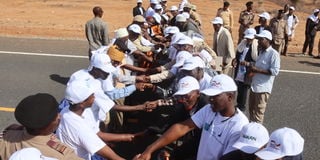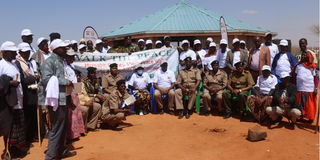Premium
Jubilation as Borana and Gabbra reconcile

Members of Borana and Gabbra communities hold hands in a call for reconciliation and forgiveness of their past evil deeds at the Funanaidha area along the Moyale-Marsabit highway on September 2, 2022.
What you need to know:
- Millions of shillings have been sunk into peacekeeping missions and over 15 peace declarations were made.
- Members of the Borana and Gabbra communities met, hugged, shared remorse, and even cried together during a peace dialogue.
- Members of the two communities also engaged in a peace walk on the Marsabit-Moyale highway for 15km.
For over a decade now, Marsabit County has struggled with inter-ethnic conflicts and bloodletting, with no end seen in sight.
Millions of shillings have been sunk into peacekeeping missions and over 15 peace declarations were made, but innocent people continued to die and the property was destroyed.
But on Thursday, a jubilant mood reigned in Turbi town and its environs.
Members of the erstwhile antagonistic Borana and Gabbra communities, who in the past six months did not see eye to eye, met, hugged, shared remorse, and even cried together during a peace dialogue.
It was organised by the Ministry of Interior and funded by the Intergovernmental Authority for Development (Igad) and Pastoralist Community Initiative and Development Assistance (Pacida), a local NGO.
Doubts were cast when Borana and Gabbra elders approached the groups and asked them to convene a peace dialogue, said Igad representative Celine Wanjira.
After the clashes of the last three years, it was natural for some people to feel apprehensive and cynical that such a meeting would yield anything useful.
Ms Wanjira said it was a stark contrast to the belligerent, hot-headed exchanges of bitterness between members of two feuding communities at past peace meetings.
“It would be unwise to get ahead of ourselves just yet and submerge ourselves into jubilant moods,” Ms Wanjira said.
“However, going by what we’ve witnessed today, I’m more than convinced that longstanding peace between the Borana and Gabbra communities is finally in the offing.”
New dawn
She attended the meeting with a mix of hope and pessimism, having brokered peace in Marsabit County for over five years now.
She said the latest meeting came as a breath of fresh air laden with renewed hopes of a new dawn in the long pursuit of peace between the Borana and Gabbra.
The intimate embraces, hand-holding, free-spirited dialogues, and even collective remorse and the shedding of tears of regret, at the meeting, grabbed centre stage, taking the attention away from what had happened in the past.
Ms Wanjira told journalists that she would go back to Nairobi a happy person after seeing that the latest peace dialogue between the feuding communities was finally yielding desirable results.

Members of Borana and Gabbra communities flanked by security agencies, and peace partners pose for a photo session after a peace dialogue at Turbi Youth Social Hall on September 2, 2022.
She was satisfied that her work was not in vain.
Pacida Executive Director Patrick Katelo also expressed delight, saying the dialogue was a new dawn, as nothing of the sort had been witnessed in the previous peace dialogues he had attended since 2005 when the Turbi massacre shook the region to the core.
He was upbeat that the desired outcomes would be reaped after the peace meeting that was initiated by members of the once antagonistic communities.
He said his organisation and others had made several unsuccessful attempts and sunk billions of shillings to bring peace between the two communities.
It had become extremely hard for even humanitarian interventions to be carried out in the drought-hit areas whenever there were conflicts,” Mr Katelo said, adding that development partners also stayed away from the county.
“But now I think we’ve got a reason to celebrate.”
Peace walk
Members of the two communities also engaged in a peace walk on the Marsabit-Moyale highway for 15km from Turbi town to the deserted neighbouring Funanidha village while chanting peace messages.
Turbi sub-county Deputy County Commissioner Nicholas Kujuba, for his part, recalled the obstacles administrators faced in trying to reconcile the two communities.
Previous fruitless peace efforts nearly prompted donors and stakeholders to close their eyes to the plight of the suffering residents.
He said Marsabit County, especially Turbi and Sololo wards, stood to gain immensely from the new turn of events if the two communities kept their word.
Sololo resident Mariam Galgallo graphically detailed how women bore the brunt of the incessant ethnic clashes.
Women had to flee with children on their backs and others behind them, with baggage on their heads.
In their hideouts, their children would cry, asking for food that their mothers could not provide.
Women whose husbands died in the conflict had to shoulder the burden of bringing children alone.
She made a passionate appeal to the two communities to never allow themselves to be drawn into any conflicts again but instead choose amicable conflict resolution.
“It is a fact that these wars have been imposed on us. Although they were triggered by the scramble for grazing fields and watering points for the herder’s animals, politicians have largely taken advantage of such conflicts,” Ms Galgallo said.
“We’re now fed up and we don’t want to go back to such anarchy.”
Sololo Peace Committee chairperson Mzee Galmah Dabaso urged the two communities to learn to be good neighbours and potential allies who should never allow anything to draw wedges between them.
He said that never again would they allow politicians to use them as pawns for their selfish gains.
Mzee Dabaso explained that they sought help from the national government and Pacida to bring them together because they realised they had nothing to gain from endless fighting and bloodshed.
Turbi resident Abdi Mamo said he wanted even the militant groups used by both communities to be part of the peace-making process.
He also wanted displaced residents to be allowed to return to their homes.
In 2005, at least 79 residents, including 12 schoolchildren, were murdered in a morning attack that became known as the Turbi massacre.
The slaughter was reportedly triggered by the killings in North Horr of a chief and a police reservist among Borana from Saku pursuing their stolen livestock.
More attacks and killings followed, perpetrated by members of both communities in retaliation and counter-retaliation.





